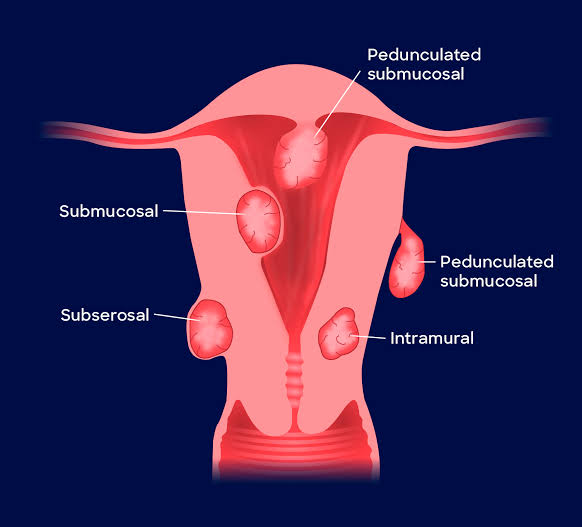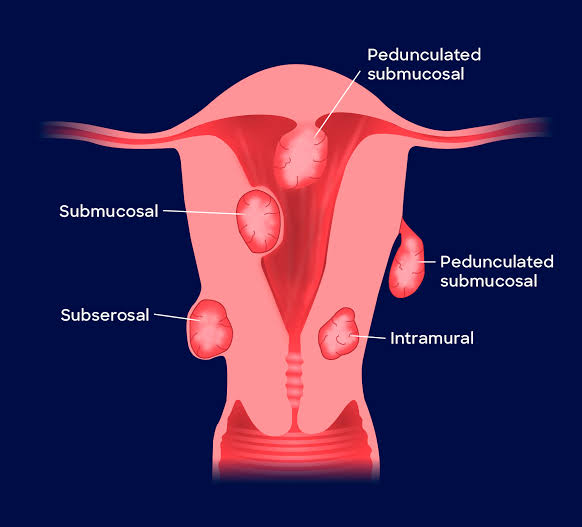UTERINE MYOMA
UTERINE MYOMA
Hi Guys!
I also have a very interesting piece today.. somewhat a deviation from the vitamins hullabaloo, lol.
So, I got to home today and one of my female friends who had been complaining about pains in her lower abdomen sent her sonography result and it was written boldly on it - Uterine Myoma.
This prompted me to make some findings.
So, Uterine Myoma, also known as Uterine Fibroids, are noncancerous growths that develop in the uterus. They are:
- Most common in women of reproductive age
- Estimated to affect up to 80% of women at some point in their lives
- More common in women of African descent
Types of Uterine Myoma:
- Subserosal (outside the uterus)
- Intramural (within the uterine wall)
- Pedunculated (attached to the uterus by a stalk)
- Submucosal (under the uterine lining)
Symptoms:
- Heavy or prolonged menstrual bleeding
- Pelvic pain or pressure
- Frequent urination
- Constipation
- Back or leg pain
- Infertility or miscarriage (rarely)
Treatment options:
- Watchful waiting
- Medications (hormonal therapies or pain relievers)
- Surgical procedures (myomectomy or hysterectomy)
- Non-surgical interventions (uterine artery embolization or MRI-guided focused ultrasound)
Well, you may be wondering why it is more common in women of African descent or origin.. these are some of the reasons -
- Genetic predisposition: Fibroids may be more common in women with a family history of the condition, and genetic variants more prevalent in African populations may contribute to this increased risk.
- Hormonal influences: Estrogen and progesterone stimulate fibroid growth. Women of African descent may have higher levels of these hormones, which could contribute to the development and growth of fibroids.
- Early onset of menstruation: Women who start menstruating at a younger age are more likely to develop fibroids. Women of African descent tend to experience menarche (first menstruation) earlier than women of other races.
- Diet and lifestyle: A diet high in processed meats, sugar, and dairy products, and low in fruits and vegetables, may contribute to fibroid development. Women of African descent may be more likely to follow such diets due to cultural or socioeconomic factors.
- Vitamin D levels: Low vitamin D levels have been linked to an increased risk of fibroids, and women of African descent are more likely to have vitamin D deficiency due to skin pigmentation and limited sun exposure.
- Socioeconomic factors: Women of African descent may face barriers to healthcare access, leading to delayed diagnosis and treatment, which can contribute to the higher prevalence of fibroids.
Here are some advice and encouragement for those diagnosed with uterine fibroids:
- Seek a second opinion: Consult a specialist (gynecologist or obstetrician) to confirm the diagnosis and discuss treatment options.
- Educate yourself: Learn about fibroids, their symptoms, and treatment options to make informed decisions.
- Don't hesitate to ask questions: Discuss your concerns, symptoms, and treatment options with your healthcare provider.
- Explore treatment options: Consider various treatments, including watchful waiting, medication, surgery, or alternative therapies.
- Prioritize self-care: Manage symptoms with pain relief, heat therapy, and stress reduction techniques like meditation or yoga.
- Connect with others: Join support groups or online forums to share experiences and find encouragement from others who understand your journey.
- Advocate for yourself: Be open and honest about your needs and concerns with your healthcare provider.
- Take care of your mental health: Fibroids can affect your mental well-being; seek support if you're experiencing anxiety, depression, or stress.
- Keep track of your symptoms: Monitor your symptoms and keep a journal to help your healthcare provider understand your experience.
- Remember, you're not alone: Many women have successfully managed their fibroids and gone on to lead healthy lives.
- Also Remember, every individual's experience with fibroids is unique. Be patient, stay informed, and work closely with your healthcare provider to find the best course of treatment for you.
For those who do not have uterine fibroids, here are some tips to promote overall reproductive health and potentially reduce the risk of developing fibroids:
- Maintain a healthy lifestyle: Eat a balanced diet, exercise regularly, and manage stress.
- Get regular check-ups: Annual gynecological exams can help detect any potential issues early on.
- Practice good menstrual hygiene: Use sanitary products that suit your needs, and change them regularly.
- Stay hydrated: Drink plenty of water to help flush out toxins and maintain hormonal balance.
- Avoid exposure to endocrine disruptors: Some plastics, pesticides, and chemicals can mimic or interfere with hormones, potentially leading to reproductive issues.
- Consider a healthy weight: Maintaining a healthy weight can reduce the risk of developing fibroids and other reproductive issues.
- Don't smoke: Smoking can increase the risk of fibroids and other health problems.
- Limit alcohol consumption: Excessive alcohol consumption can lead to hormonal imbalances and increase the risk of fibroids.
- Get enough vitamin D: Vitamin D deficiency has been linked to an increased risk of fibroids.
- Be aware of your family history: If you have a family history of fibroids or other reproductive issues, discuss your risk with your healthcare provider.
I want to believe you have learned a thing or more from this piece and I assure this is one of the pieces I have done a lot of findings on.
The following are my references in case you want to read more -
- Frontiers in Pharmacology - "Uterine fibroids — Causes, impact, treatment, and lens to the African perspective" (January 2023).
- Medical News Today - "Fibroids in Black women: Rates, impact, and more" (April 28, 2021).
- BMC Public Health - "Global, regional, and national time trends in incidence, prevalence, years lived with disability for uterine fibroids, 1990–2019" (2023).
Images were gotten from Google.
Thank you for reading through. Kindly drop a comment to motivate me to keep doing this.
Hi Guys!
I also have a very interesting piece today.. somewhat a deviation from the vitamins hullabaloo, lol.
So, I got to home today and one of my female friends who had been complaining about pains in her lower abdomen sent her sonography result and it was written boldly on it - Uterine Myoma.
This prompted me to make some findings.
So, Uterine Myoma, also known as Uterine Fibroids, are noncancerous growths that develop in the uterus. They are:
- Most common in women of reproductive age
- Estimated to affect up to 80% of women at some point in their lives
- More common in women of African descent
Types of Uterine Myoma:
- Subserosal (outside the uterus)
- Intramural (within the uterine wall)
- Pedunculated (attached to the uterus by a stalk)
- Submucosal (under the uterine lining)
Symptoms:
- Heavy or prolonged menstrual bleeding
- Pelvic pain or pressure
- Frequent urination
- Constipation
- Back or leg pain
- Infertility or miscarriage (rarely)
Treatment options:
- Watchful waiting
- Medications (hormonal therapies or pain relievers)
- Surgical procedures (myomectomy or hysterectomy)
- Non-surgical interventions (uterine artery embolization or MRI-guided focused ultrasound)
Well, you may be wondering why it is more common in women of African descent or origin.. these are some of the reasons -
- Genetic predisposition: Fibroids may be more common in women with a family history of the condition, and genetic variants more prevalent in African populations may contribute to this increased risk.
- Hormonal influences: Estrogen and progesterone stimulate fibroid growth. Women of African descent may have higher levels of these hormones, which could contribute to the development and growth of fibroids.
- Early onset of menstruation: Women who start menstruating at a younger age are more likely to develop fibroids. Women of African descent tend to experience menarche (first menstruation) earlier than women of other races.
- Diet and lifestyle: A diet high in processed meats, sugar, and dairy products, and low in fruits and vegetables, may contribute to fibroid development. Women of African descent may be more likely to follow such diets due to cultural or socioeconomic factors.
- Vitamin D levels: Low vitamin D levels have been linked to an increased risk of fibroids, and women of African descent are more likely to have vitamin D deficiency due to skin pigmentation and limited sun exposure.
- Socioeconomic factors: Women of African descent may face barriers to healthcare access, leading to delayed diagnosis and treatment, which can contribute to the higher prevalence of fibroids.
Here are some advice and encouragement for those diagnosed with uterine fibroids:
- Seek a second opinion: Consult a specialist (gynecologist or obstetrician) to confirm the diagnosis and discuss treatment options.
- Educate yourself: Learn about fibroids, their symptoms, and treatment options to make informed decisions.
- Don't hesitate to ask questions: Discuss your concerns, symptoms, and treatment options with your healthcare provider.
- Explore treatment options: Consider various treatments, including watchful waiting, medication, surgery, or alternative therapies.
- Prioritize self-care: Manage symptoms with pain relief, heat therapy, and stress reduction techniques like meditation or yoga.
- Connect with others: Join support groups or online forums to share experiences and find encouragement from others who understand your journey.
- Advocate for yourself: Be open and honest about your needs and concerns with your healthcare provider.
- Take care of your mental health: Fibroids can affect your mental well-being; seek support if you're experiencing anxiety, depression, or stress.
- Keep track of your symptoms: Monitor your symptoms and keep a journal to help your healthcare provider understand your experience.
- Remember, you're not alone: Many women have successfully managed their fibroids and gone on to lead healthy lives.
- Also Remember, every individual's experience with fibroids is unique. Be patient, stay informed, and work closely with your healthcare provider to find the best course of treatment for you.
For those who do not have uterine fibroids, here are some tips to promote overall reproductive health and potentially reduce the risk of developing fibroids:
- Maintain a healthy lifestyle: Eat a balanced diet, exercise regularly, and manage stress.
- Get regular check-ups: Annual gynecological exams can help detect any potential issues early on.
- Practice good menstrual hygiene: Use sanitary products that suit your needs, and change them regularly.
- Stay hydrated: Drink plenty of water to help flush out toxins and maintain hormonal balance.
- Avoid exposure to endocrine disruptors: Some plastics, pesticides, and chemicals can mimic or interfere with hormones, potentially leading to reproductive issues.
- Consider a healthy weight: Maintaining a healthy weight can reduce the risk of developing fibroids and other reproductive issues.
- Don't smoke: Smoking can increase the risk of fibroids and other health problems.
- Limit alcohol consumption: Excessive alcohol consumption can lead to hormonal imbalances and increase the risk of fibroids.
- Get enough vitamin D: Vitamin D deficiency has been linked to an increased risk of fibroids.
- Be aware of your family history: If you have a family history of fibroids or other reproductive issues, discuss your risk with your healthcare provider.
I want to believe you have learned a thing or more from this piece and I assure this is one of the pieces I have done a lot of findings on.
The following are my references in case you want to read more -
- Frontiers in Pharmacology - "Uterine fibroids — Causes, impact, treatment, and lens to the African perspective" (January 2023).
- Medical News Today - "Fibroids in Black women: Rates, impact, and more" (April 28, 2021).
- BMC Public Health - "Global, regional, and national time trends in incidence, prevalence, years lived with disability for uterine fibroids, 1990–2019" (2023).
Images were gotten from Google.
Thank you for reading through. Kindly drop a comment to motivate me to keep doing this.




